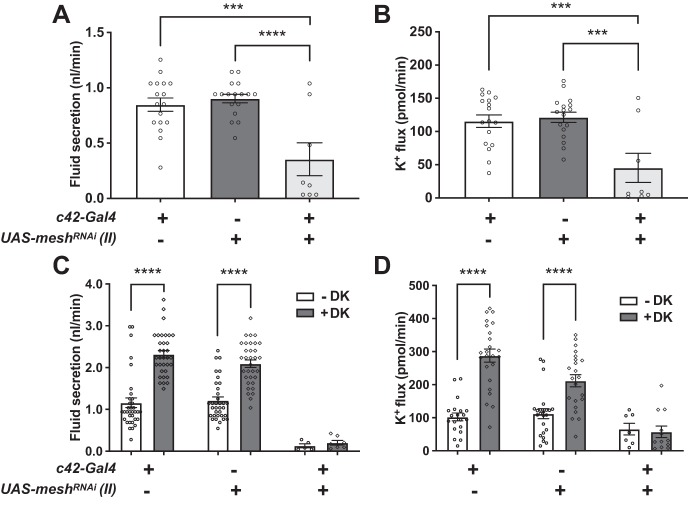Fig. 9.
Impaired transepithelial fluid and K+ transport in the developmental principal cell mesh knockdown tubule using mesh RNA interference (RNAi) line 6867. A and B: transepithelial basal fluid secretion (A) and K+ transport (B) are significantly reduced in developmental mesh knockdown tubules from 3–4-day-old adult female flies [w;UAS-meshRNAi (II)/+;c42-GAL4/+] compared with control groups [w;c42-GAL4/+ and w;UAS-meshRNAi (II)/+]. Here, n = 17 control tubules per genotype (100% of analyzed tubules secreting), and n = 8 mesh knockdown tubules (~44% of analyzed tubules secreting); one-way ANOVA P < 0.0001 (A) and 0.0003 (B). ***P ≤ 0.001, ****P < 0.0001. P values for Tukey’s multiple comparisons test are shown in Table 2. C and D: compared with increased control tubule fluid and K+ transport, Drosophila kinin (DK, 1 µM) treatment has no effect on mesh knockdown tubule transport. Here, n = 20–24 control tubules per condition (100% of analyzed tubules secreting), and n = 7–12 mesh knockdown tubules per condition (~29% of analyzed tubules secreting in −DK and 50% of analyzed tubules secreting in +DK); two-way ANOVA P < 0.0001 for the effects of genotype, DK treatment, and interaction. ****P < 0.0001. P values for Sidak’s multiple comparisons test are shown in Table 2. Data are expressed as means ± SE.

